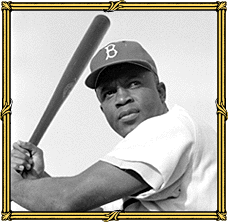The Robinsons

Jackie Robinson is one of the most admired people in sports. But unlike most sports heroes, his battles did not take place only on the athletic field. His most important battles were against the pervasive national racism that not only excluded blacks from participation in major league baseball, but from economic opportunities in fields of all kinds. Robinson led the Dodgers to four National League pennants and one World Series championship in 1955. And, in the process, he led his nation in a struggle for civil rights that continues today -- but he didn't do it alone.
When the Brooklyn Dodgers' Branch Rickey began his search for a talented and educated black baseball player to be the first to integrate the sport, twenty-six-year-old Jackie Robinson seemed the perfect man for the job. A graduate of UCLA, he was a superb four-sport athlete with strong religious roots and a strict work ethic. But, Rickey realized the hard road that lay ahead of Robinson, and during their first meeting, on August 28, 1945, he harshly questioned him about whether or not he could handle the hatred, threats of violence, and baiting he would have to endure as he crossed the color line. In his autobiography, Robinson recalled Rickey asking, "You got a girl? There are going to be times when you're going to need a woman by your side."
Rachel Isum was Robinson's fiancee. They had met in 1940 when she was a first-year nursing student at UCLA and he was already an accomplished athlete. They were married on February 10, 1946. Two weeks after the wedding, they left for Robinson's first spring training, for the minor league Montreal Royals, in Daytona Beach, Florida -- the deep south, a bastion of hard-core racism. In an interview with the Houston Chronicle, Rachel Robinson later recalled, "That first spring training was like a nightmare. There was so much degradation. There was bigotry like we had never encountered." But Jackie, with Rachel at his side, endured the indignities of the training trip and a season filled with countless insults, threats, and bean balls on his way to leading the league in batting, runs scored, and fielding. The next spring, despite a threatened boycott by the club's players, the Brooklyn Dodgers promoted Robinson to the major league -- seven years before the Brown vs. Board of Education Supreme Court ruling integrated the country's schools. In the majors, the Robinsons again suffered through death threats, constant verbal harassment from managers, players, and fans, and physical abuse, including more pitches to his head and body. But Robinson succeeded in winning the respect of players and fans and was named Rookie of the Year in 1947, after batting .297 with 125 runs scored and twenty-nine stolen bases and leading his team to a National League title. By 1949, with the signing of more blacks to major league baseball, integration had arrived in major league baseball. Throughout his life, Jackie credited his wife Rachel for providing the support that allowed him to work through the difficulties of his baseball career. "Strong, loving, gentle and brave, never afraid to either criticize or comfort," he once wrote of his wife. Later, according to People magazine, he said, "When they try to destroy me, it's Rachel who keeps me sane." People also reported that Norma King, wife of Dodger pitcher Clyde King, once said of Rachel, "I recall the look of pride on her face watching him play while the rest of us were worrying about whether our husbands would do something foolish." After Jackie's retirement from baseball in 1956, the Robinsons continued to play a visible role in politics and the civil rights movement. They were staunch supporters of Martin Luther King, Jr. and the fight against segregation, and spoke out against black separatists like Stokely Carmichael. The Robinsons were especially proud of their three children, Jackie Jr., Sharon, and David. Sadly, Jackie Jr. died in a car accident in 1971. In an interview with the Boston Globe, daughter Sharon said of her parents, "The house revolved around my father, but my mother was always the center of the family. She was in a real partnership with my father. We felt that. We knew that. He appreciated it and we did too." Even after a heart attack cut short Jackie's life on October 23, 1972, Rachel, who has also worked as a nurse and teacher, has continued to work hard to advance the legacy that she and her husband began as newlyweds. In 1973, she founded the Jackie Robinson Foundation, which she still chairs. To date, the foundation has raised hundreds of thousands of dollars in scholarships to help send more than 500 minority and underprivileged students to college. Rachel Robinson continues her husband's work of leading by example. Many who knew the couple are not surprised. Major league first baseman Mo Vaughn, who wears number 42 in honor of his hero, Jackie Robinson, once told the Boston Globe, "Jackie Robinson couldn't have been Jackie Robinson if it wasn't for Rachel Robinson. It's another case of the fact that behind every good man is a good woman. Study your history. He wanted to quit. She wouldn't let him."

0 Comments:
Post a Comment
<< Home